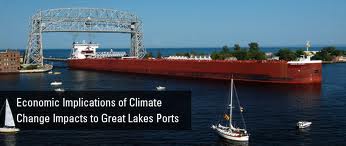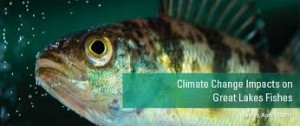By the turn of the century, increasing temperatures may make Michigan summers feel more like Arkansas while those

Image: Ohio State University
in Illinois may start to feel like Texas.
And as the Great Lakes region becomes warmer and wetter due to climate change, it should brace for a wider variety of pest and weed attacks and more nutrients running into the lakes, according to the Union of Concerned Scientists, a science-based watchdog organization.
Ohio Department of Natural Resources officials are taking steps to mitigate those effects now.
The agency is meeting Wednesday with climate change experts from the National Oceanic and Atmospheric Administration, local health departments and sewer districts to discuss how the state can prepare communities and leaders for looming climate change challenges.
The workshop includes government officials, storm water managers, watershed managers, public health officials and city planners, said Heather Elmer, coordinator of the Ohio Coastal Training Program.
The effort is funded by the U.S. Environmental Protection Agency’s Great Lakes Restorative Initiative.
“This is our chance to inform our decision makers about the state of science regarding climate change so they can make decisions based on real scientific projections,” she said.

Image: Ohio State University
Similar workshops will be held in Minnesota and Wisconsin in September.
They already have been held in the U.S. coastal regions, said Patrick Robinson, a land grant specialist with the University of Wisconsin Extension program.
Scientists like Gwen Shaughnessy, a climate adaptation specialist with National Oceanic and Atmospheric Administration Coastal Services Center, say she sees no use to ‘re-invent the wheels’ when there is already information gathered from the coastal programs.
“Though we use our experiences as a template for these workshops, we realize that we need to modify and tailor them for each region’s needs,” she said.
But each region will focus on slightly different issues.
Ohio officials plan to discuss how local and federal regulations are likely to affect local strategies necessary to counter the projected effects of climate change, said Heather Stirrat, NOAA’s Great Lakes coordinator.
“We’ll look into regulations that need to be changed to pave way for changes that need to be made for future heavy storms, sewer overflows and nutrient overloads,” she said.
Wisconsin leaders feel no reason to talk regulations.
“Those involved in Wisconsin feel regulations are too complex and convoluted to get into,” said Robinson. “They just want to help communities understand climate change and what climate change strategies may look like in order to increase acceptance and engagement by local people.”
Shaughnessy from NOAA will present planning concepts for severe weather events associated with climate change, which she says is not as complex as people think.
“It’s about what people should think about when planning adaptation processes and who should be involved in those processes,” she said.
She will also present case studies from the International Council for Local Environmental Initiatives, an international organization involved in sustainability development where she has led similar workshops.
Shaughnessy will also present some common barriers that prevent local leaders from planning for climate change and ways to work through them.
And she will help leaders identify what is most vulnerable to climate change and discuss ways to protect those assets.
The one-day workshops are planned for the Cleveland Museum of Natural History on Wednesday, the University of Wisconsin’s University Union at Green Bay on September 13 and the EPA Mid-continent Ecology Division Laboratory in Duluth on September 22. They are open to the public.
Those interested in the workshops can follow this link to register.
If the workshops are successful, more will be planned for other states in the region, said Robinson.
For more information on the impacts of climate change in Wisconsin, check out a recent report from the Wisconsin Initiative on Climate Change Impacts, Wisconsin’s Changing Climate: Impacts and Adaptation. The report can be downloaded at http://www.wicci.wisc.edu/publications.php
Isn’t it ironic that Man has so little faith in his ability to not foul his nest that he is willing to settle for second or third best outcomes. I don’t argue with being prepared, but, we, the great thinkers, think it is time to prepare for negative climate disruptions that we are causing. That is a sad thought.
A Nature Conservancy report last year examined this subject on Lake Champlain. Researchers found that management practices that are already in place would help the basin adapt to a warmer and potentially wetter future. However they must be better implemented, enforced and funded. Infrastructure needs to be re-evaluated to handle more intense rains and runoff. Here’s a link to the report: http://bit.ly/o2nSuC